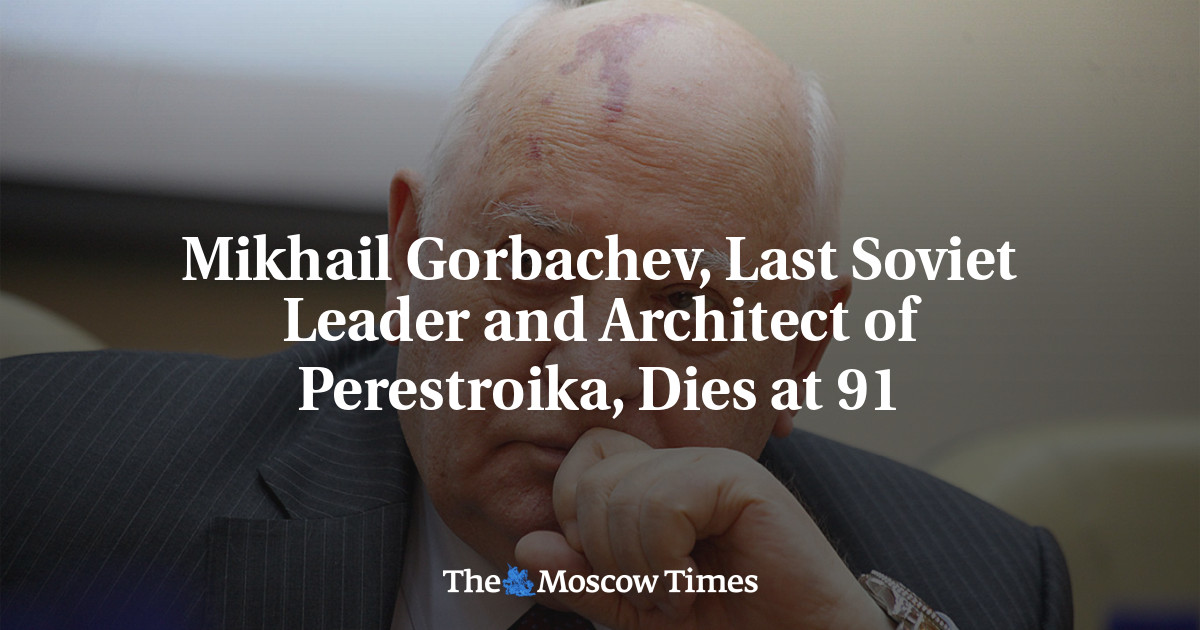
Mikhail Gorbachev, whose actions as the last General Secretary of the Communist Party of the Soviet Union helped shape the world as we know it today, died after a "serious and long illness" late Tuesday, the state-run TASS news agency reported, citing the Moscow Central Clinical Hospital. He was 91.
His era started in 1985 with the reform of the Soviet system forever known by its Russian name, perestroika, and ended with the coup that led to the collapse of the Soviet Union in 1991. While he was admired in the West for his role in ending the Cold War, he was a divisive figure at home, perceived to have instituted policies that precipitated the dissolution of the Soviet Union and the economic chaos and loss of superpower status that followed. Gorbachev was born on March 2, 1931, to a family of Russian-Ukrainian peasants in the village of Privolnoye, in the southwestern part of Soviet Russia. The village was collectivized under Soviet leader’s Joseph Stalin’s first five-year plan that included forced consolidation of small landholdings into state-controlled farms, a process that claimed the lives of millions of peasants throughout the Soviet Union. Both of Gorbachev’s grandfathers were sent to Gulag labor camps during Stalin’s repressions of the 1930s, and his family endured the 1932-33 famine. Those early experiences shaped Gorbachev’s views on Stalinism and the use of violence as means to power, according to his biographer William Taubman. Gorbachev joined the Communist Party while in high school. He won a scholarship to the most prestigious university in the Soviet Union, Moscow State University, where he excelled and graduated from the law faculty with the highest honors. He also met and married the love of his life, Raisa. He attracted the attention of the Politburo in 1974 when, as party boss in the Stavropol region, his construction of the Great Stavropol Canal provided necessary irrigation and produced record crops. In 1978, he joined the ranks of the Soviet ruling elite in Moscow when he was appointed Secretary of the Central Committee. That same year he became the party secretary responsible for agriculture as the collective farming model began to falter. Gorbachev attempted to modernize the Soviet agricultural sector by introducing mechanization. During these years he also traveled to Western Europe in Soviet delegations which continued to expand and shape his views on the world and politics. When Gorbachev was appointed to the top job in 1985, the U.S.S.R. was in economic, social and political decline after the so-called “stagnation” period under Leonid Brezhnev and the short-lived tenures of Yuri Andropov and Konstantin Chernenko. His twin policies of perestroika — rebuilding — and glasnost — openness — aimed to restructure the Soviet system and bring transparency to its politics by loosening state censorship. Gorbachev also sought to shift control from the Politburo to the Soviet people by implementing a democratically elected parliament. He attempted to reform the Soviet centrally-planned economy by allowing state enterprises to determine their output levels based on demand and permitting self-financing. The state would no longer rescue unprofitable enterprises, and control shifted from state to elected workers’ collectives. Most significantly, Gorbachev also allowed foreign investors to enter the Soviet market. His reform efforts were often undermined by bureaucrats within his own party. A fundamental test of the new system came on April 26, 1986, when a reactor at the Chernobyl power plant exploded and caused the world’s worst nuclear accident. It took Gorbachev almost three weeks to address the nation on the disaster, and 20 years later he said it had perhaps been Chernobyl, rather than perestroika, that was the real cause of the collapse of the Soviet Union. The Cold War was in full swing when Gorbachev took power. Five years previously, U.S. President Jimmy Carter had refused to send athletes to the Moscow Olympics or meet with anyone from the Soviet leadership to protest the 1979 Soviet invasion of Afghanistan. Within six years Gorbachev had withdrawn Soviet troops from Afghanistan and acted as middleman between Washington and Baghdad during the Gulf War. Western leaders saw Gorbachev’s leadership as an opportunity to open the Iron Curtain. He visited Britain, France, Germany, Canada and many other countries during his rule. British Prime Minister Margaret Thatcher famously said in a BBC interview, “I like Mr. Gorbachev. I think we can do business together.” Some praised Gorbachev for watching the peaceful dissolution of the Eastern bloc, while others criticized him for allowing the communist systems in neighboring countries to collapse without any interference. His far-reaching agreements on arms control paved the way for the Paris Charter that ended the Cold War and united Eastern and Western Europe. In Nov. 1989, shortly after Gorbachev’s visit to East Germany, the Berlin wall fell. Gorbachev repeatedly stated that the dissolution of the Soviet Union was never his end goal, but his leadership started a chain reaction that changed the world. In 1990, Gorbachev was awarded the Nobel Peace prize for his accomplishments in international relations. At home, however, the loss of the Eastern bloc and Gorbachev’s to sign a new Union Treaty that would refound the U.S.S.R. as a loose confederation, angered many within his own party, turning former allies into enemies. In August 1991, while Gorbachev was on vacation with his family in Crimea, hardline politicians and the military staged a failed coup in Moscow and put him under house arrest. By the time he returned to the capital, Boris Yeltsin had seized the momentum and would become the first president of a new Russia. The Soviet Union didn’t last the year. After his political career ended, Gorbachev established the “Gorbachev Foundation” and continued to lecture and speak out on social, economic, domestic and geopolitical issues. His beloved Raisa, who he described as his closest confidant, died of leukemia in 1999. He is survived by his daughter Irina, and his granddaughters Anastasia and Ksenia.
#Mikhail #Gorbachev #Soviet #Leader #Architect #Perestroika #Dies
https://www.globalcourant.com/mikhail-gorbachev-last-soviet-leader-and-architect-of-perestroika-dies-at-91/?feed_id=17982&_unique_id=630e7e217eeb1

إرسال تعليق